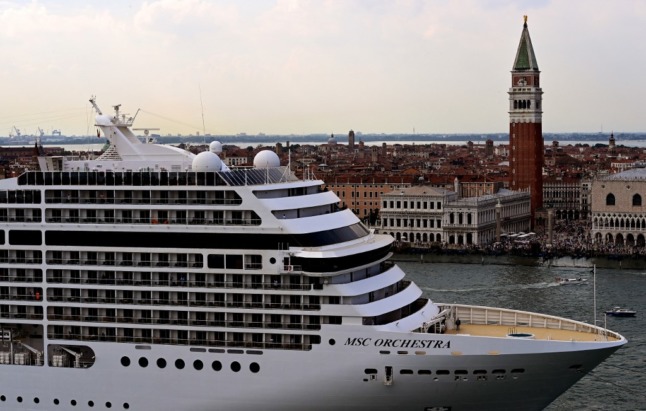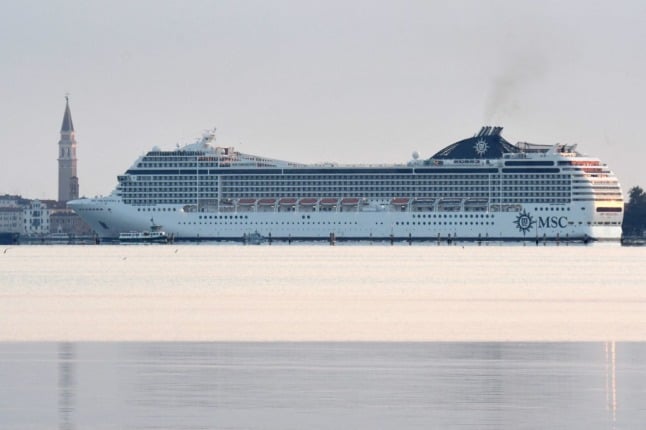For hundreds of years, Yiddish, a mix of medieval German and other languages, was the main language of the Ashkenazi Jews who lived on the Rhine River, before spreading across Europe.
The Holocaust and the assimilation of Jews into wider Western cultures have had a devastating effect on the language.
But at the height of its usage various dialects were spoken by millions of Jews across Europe and the world.
And its effect on German culture can clearly be felt in the colourful influence it has had on German slang, which survives in common expressions used to this day.
1. Ische – woman or chick

Being called “Ische” can be enough reason for fury; Photo: DPA
“Guck’ mal die Ische da!” (Check out that chick over there!), you may hear a buff, tattooed German call out to his mate.
Ische was adopted from Yiddish in the 18th century and originally meant young girl, young woman or (girl-)friend.
These days it is often considered demeaning to women, so best not use it on your German girlfriend as some kind of pet name!
2. Schlamassel – tough luck
If you call your girlfriend “Ische”, you know you’ll be knee-deep in “Schlamassel”.
“Massel” originally meant luck, which, coupled with the German word “schlimm” (meaning bad), turned into tough luck – “Schlimm-Massel”, according to a report by Deutschlandradio.
Coloquial use then morphed the prefix “Schlimm” into “Schlamm” (English: mud) – and you can get stuck in there pretty badly.
3. Schmusen – kissing, cuddling and more

Schmusen all the way; Photo: DPA
Once you and your partner have hopefully made up, there will be lots of “schmusen”.
Schmusen entails the whole range of kissing, cuddling, fondling, snuggling, stroking, squeezing and the like. Really, there are no limits to your schmusen practices.
Originally though, schmusen came from from the Yiddish-German word “Schmu”, which either describes the less cosy practice of achieving something by dishonourable means or denotes a straight-up lie, whence the English word schmoozing.
4. Pleitegeier – vulture of bankruptcy

The Pleitegeier is just waiting for you to go bust. Photo: DPA
“Pleitegeier” originally came from the Yiddish words Pleite (bankruptcy) and Geher (walker), which describes a person who escapes from his debts, reports Deutschlandradio.
The verbatim German translation means “bankruptcy vulture” – a bird that hovers over your business waiting for it to go bankrupt and pick its bones – and is used as a wonderfully ominous metaphor.
For example: “Im Moment kreist der Pleitegeier über Europa” – At the moment the bankruptcy vulture is circling over Europe.
5. Moos – moss… or money

Moos talks. Photo: DPA
If the Pleitegeier is hovering, what you need most is a bit of Moos in the pocket. It translates to moss or money in English, and as the saying goes: ”ohne Moos, nichts los” (You can't do anything without money).
Including Mäuse and Meiermann (a term for the former 5 German-mark bill), Moos is one of many German euphemisms for money derived from Yiddish, reports Jüdische Allgemeine.
According to the Duden German dictionary, the meaning of the word Moos was originally small change or coins, but can now be used to describe any type of cash.
6. Maloche – hard work

Malochen gehen – going to work hard; Photo: DPA
But, since money doesn’t grow on trees or spread like weeds, what you need to go do is “malochen”, which means to work hard.
In the book “Die bittersüße Last der Arbeit” (The bittersweet burden of toil), Peter Heisch writes that Upper Silesian mine workers spread the use of the word in the so-called “Kohlepott” (pot of coal) – a part of the Ruhr area in the northwest of Germany that used to be famous for its heavy mining industry.
Having adopted the word from Polish Jews, the workers used it to describe the intense physical tasks they had to perform in the mines. But now if you've had a hard day at the office you could complain: “Ich war heute malochen.”
7. Koscher – good, right

If the price is jacked up, something isn't koscher. Photo; DPA
“Das ist mir hier alles nicht ganz koscher,” (Something doesn’t seem kosher here) your grey, grumpy neighbour may mutter as he’s examining his electricity bill.
That doesn’t mean his electric company made a joke about leaving Jewish religious dietary laws on the bill.
Instead, he wants to say that something isn’t quite “right” – the company probably jacked up the prices.
The word originally denoted clean, impeccable, and pure. Specifically, it meant in keeping with Kashrut, the Jewish dietary laws, which, for instance, obligate Jews to drain the blood from the meat they are eating.
According to the online dictionary DWDS, the word can be traced back to German documents from the first half of the 18th century. Nowadays it is used to examine if something (like an electric bill) is honest and trustworthy.
8. Tacheles – real talk

Talking Tacheles is no time for beating around the bush. Photo: DPA
And because your average German neighbour doesn’t just let a dodgy-looking bill pass, he'll give the company a call. When he does, it’s time to talk “Tacheles”.
“Tacheles reden” has its roots in the Yiddish word tachles, which means aim or purpose.
In everyday modern parlance, the phrase means to get straight to the point.
And when Germans talk Tacheles, you might want to leave the room, because it's going to get messy.
9. Meschugge – crazy

The fine line between confused and crazy. Photo: DPA
It may turn out though, that your neighbour just misread the bill. In that case, he’s meschugge – not in the right state of mind (or down right crazy).
The word made its way from Yiddish into the conversations of German metropolitans in the 19th century. In fact, Jews taught Germans multiple forms of telling someone that they’ve got a screw loose.
Another expression which can be traced back to Yiddish is “nicht mehr alle Tassen im Schrank haben” (literally: to not have all the cups in the cupboard), which appears to be a play on the Yiddish word toschia, meaning cleverness, reports Jüdische Allgemeine.
Don't tell the grumpy neighbour that he's got a few of those cups missing though, or you'll be in trouble quicker than you can say Schlamassel.
For all The Local's guides to learning German CLICK HERE


.jpg)


 Please whitelist us to continue reading.
Please whitelist us to continue reading.
Member comments